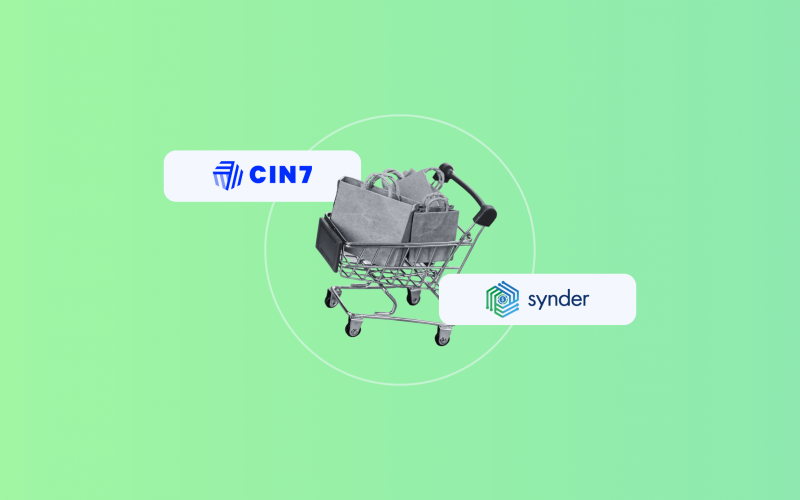Online retail comes with endless possibilities for making a sale. World-famous marketplaces, social media platforms, and various other sales channels are great examples. Combine this with different payment options, and you have an accurate picture of the environment in which today’s online sellers operate. But this abundance comes with a host of complexities at every step. With too many cogs in the online retail machine, it’s easy to get overwhelmed and negatively impact your financials.
However, your business model should work for you, not against you.
That’s why today, we want to introduce you to a joint venture of Synder and Cin7 Core, which is tailor-made to address the challenges of multichannel ecommerce by automating it almost entirely.
Contents:
1. What multichannel selling looks like
2. What are the most common problems that the multichannel model generates?
3. How do Synder and Cin7 Core solve multichannel ecommerce problems?
What multichannel selling looks like
Let’s first set the stage for the complexity of the multichannel model.
Imagine two gigantic rooms partitioned by a door. A door that symbolizes a sale. On the inside, before a sale is made, there are your products, moving through a supply chain, acquiring various costs, and traveling between the suppliers and your warehouses. On the outside of this door, products are being shipped to your customers, payments and fees are made, and sales are recorded and reconciled.
For you as a seller, that’s a very complex journey that starts way before the customer arrives at your store and long after they receive their product. For your customers, it’s just a simple process of choosing the product they like and paying for it.
But what you need to focus on is attracting more customers, in other words, increasing sales. Every other bit that can be automated—should be automated. But often it isn’t, and here’s where our story begins.
What are the most common problems that the multichannel model generates?
Multichannel online sellers face much more complex issues than other sellers in terms of managing the products, orders, sales, and accounting. Let’s have a look at what these common issues are.
Not synchronized stock levels and COGS across multiple channels
Keeping stock levels synchronized across multiple channels like ecommerce platforms, marketplaces, and even physical locations such as warehouses, and brick-and-mortar stores is complicated. Inaccurate stock levels can lead to stockouts or overselling, which can easily damage your business’s reputation with customers or decrease sales.
But it’s not only the stock levels that you should account for but the costs associated with the products too. Without proper COGS (the direct costs of goods sold) or landed costs (the money it takes to get your products to your customers’ doors) you can never really know whether your business is profitable or not.
No clear view of fees and withheld taxes
In ecommerce, nothing is certain but fees. You’ll encounter them in every service you use, whether it’s for selling or managing payments.
Service providers automatically deduct fees from your balance, but it’s your responsibility to account for these costs in your books. The same is true for withheld tax, or what is also known as marketplace facilitator tax. While this type of tax is collected and remitted on your behalf by some platforms, you need to adequately record it in your books.
Many businesses go through the platform statements and add the fees and withheld taxes manually. It’s a time-consuming and increasingly costly task, as you try to keep up with your growing business. What’s more, each platform, payment processor, or marketplace has its own way of sharing this information with the users, making it challenging to gather all the necessary numbers.
Order fulfillment mismanagement
Managing order fulfillment efficiently is problematic especially when volumes are coming from multiple channels. Smooth order fulfillment has become a staple for a successful ecommerce business. There are even businesses that won the market by offering swift delivery.
However, issues that cause delays or errors in shipping negatively impact customer satisfaction. The same goes for insufficient tracking information. If customers can’t reliably track the progress of their orders, including shipping, it can lead to frustration, anxiety, and even negative reviews.
And we’ve all seen businesses losing money over a string of bad reviews regarding poor order fulfillment.
Problematic multichannel reconciliation
Reconciliation in ecommerce can be challenging because the money deposited into your bank account from sales isn’t your total sales revenue, but rather your net revenue.
Every marketplace or payment processor deducts numerous fees before sending you a payout. These costs can be directly linked to the transaction, like payment processing fees or they can be indirect, like storage or subscription fees. So understanding which numbers you need to reconcile isn’t an easy task.
Since ecommerce reconciliation is best done per payment method, the more payment methods you offer the easier it is for your customers to pay you but harder for you to reconcile. What’s more, when orders originate in one platform and then are paid in another (a usual occurrence in ecommerce) reconciliation becomes a logistical nightmare. This complex data is usually handled by the tireless accountants and bookkeepers who comb through the statements, trying to match the numbers. But this costs you money.
How do Synder and Cin7 Core solve multichannel ecommerce problems?
As your products move from your suppliers until you make a sale and record it, you want the whole process to be seamless, efficient, and accurate. These numbers are there to support you as you make business decisions. Whether you want to grow or cut costs, you need to trust your numbers.
And Synder-Cin7 Core lets you achieve it, from beginning to end.
Synder-Cin7 Core integration covers all your multichannel bases
This integration manages your product movement from the moment of purchasing them from the suppliers, all the way through the reconciliation of your sales data.
Everything works in harmony, with all parts of the ecommerce system synchronized and recorded, both in terms of the physical item and an actual sale.
That’s why Synder-Cin7 Core integration is a perfect solution for multichannel ecommerce sellers as it automates the entire process.
Multichannel stock synchronization with accurate COGS calculations
Cin7 Core offers automated synchronization across all your channels to keep stock levels accurate in real time. No matter where your inventory is stored, your business operates as a unified whole. With Cin7 Core, you can ensure that your stock levels are optimal across all locations. This means not too much—to avoid tying the cash—and not too little, to always have a sufficient amount of products ready for sale.
On the cost side of your stock, accurate calculation of COGS and landed costs lets you understand the true numbers associated with your products throughout their entire lifecycle. This, in turn, gives you real insights into the profitability of your business.
Management of fees and withheld taxes
Fees need to be accurately recorded in your accounts, even if they were automatically deducted by the platform. Through Synder’s direct integration with major sales channels, marketplaces, and payment processors, all fees get reflected in your books in real-time.
Synder not only automatically syncs every fee into your books but also helps you allocate them according to your unique bookkeeping system needs. In other words, if you want to keep all your processing fees in one account, while storage fees in another, with Synder, that’s easy. Smart Rules help you customize the flow of your transaction data (including fees and other charges) into your books the way you want to.
The same is true for recording your marketplace facilitator tax. Once set up, Synder will automatically sync this withheld tax information into your books and apply any customization you choose.
Automated order processing
Cin7 Core offers automated order processing and integrates with shipping services to provide seamless delivery and tracking information back to the end customer.
With multiple inventory locations and sales channels, this synchronization is key. Buyers want a smooth, transparent ordering and shipping process no matter how complex it is for the seller. And with Cin7 Core, you can automate order fulfillment, so that it literally takes care of itself.
Multichannel reconciliation
Synder manages multichannel reconciliation by getting source data from all your connected channels. And even if you can’t see a high level of granularity in your data provided by sales channels or payment processors, Synder can. It syncs all this information straight into your books which makes the multichannel reconciliation process a breeze.
Synder creates a special clearing account per each connected platform and records there all the pre-matched transactions based on your bank statement information and data from the platforms. This way, transactions in a clearing account are automatically matched and ready for a one-click reconciliation.
Closing thoughts
To reap the benefits of multichannel selling, you need to automate the maze of platforms, including inventory, order management, sales channels, payment processing, and connect them to accounting software. What’s more, for the system to function as a unified ecosystem, it requires feedback loops, cross-verification, and continuous updates of this enormous pool of data.
The unique integration of Synder and Cin7 Core lets you cover the entire sales funnel and automate these complex processes so that you can concentrate on what matters most in your business: increasing sales.







Thanks for the article! It’s amazing that Synder acquired multichannel Ecommerce. Will implement something similar in my professional UK accountants business.
Hi David, we’re very glad you like our new Synder-Cin7 Core integration! It’s a perfect choice for multichannel ecommerce. Best of luck!